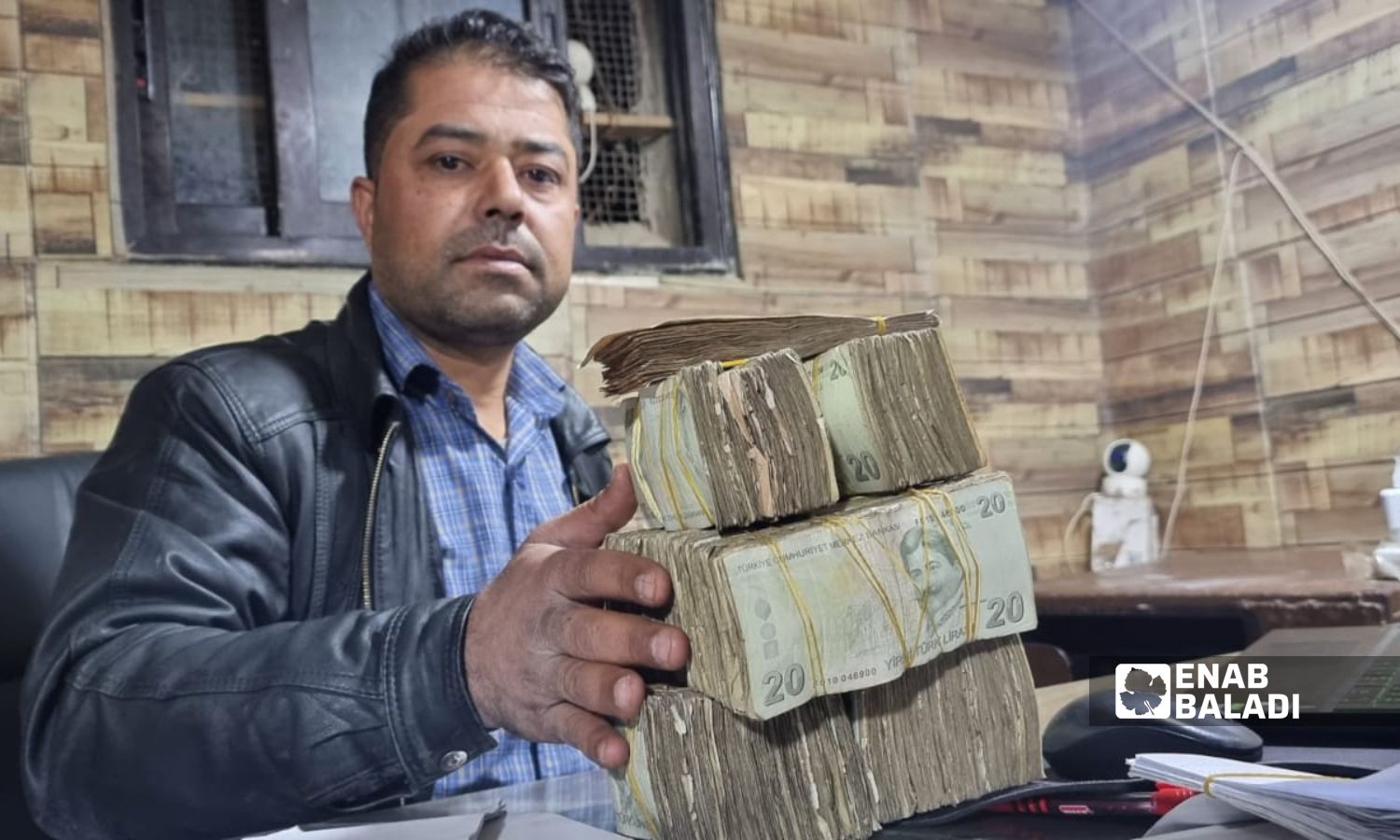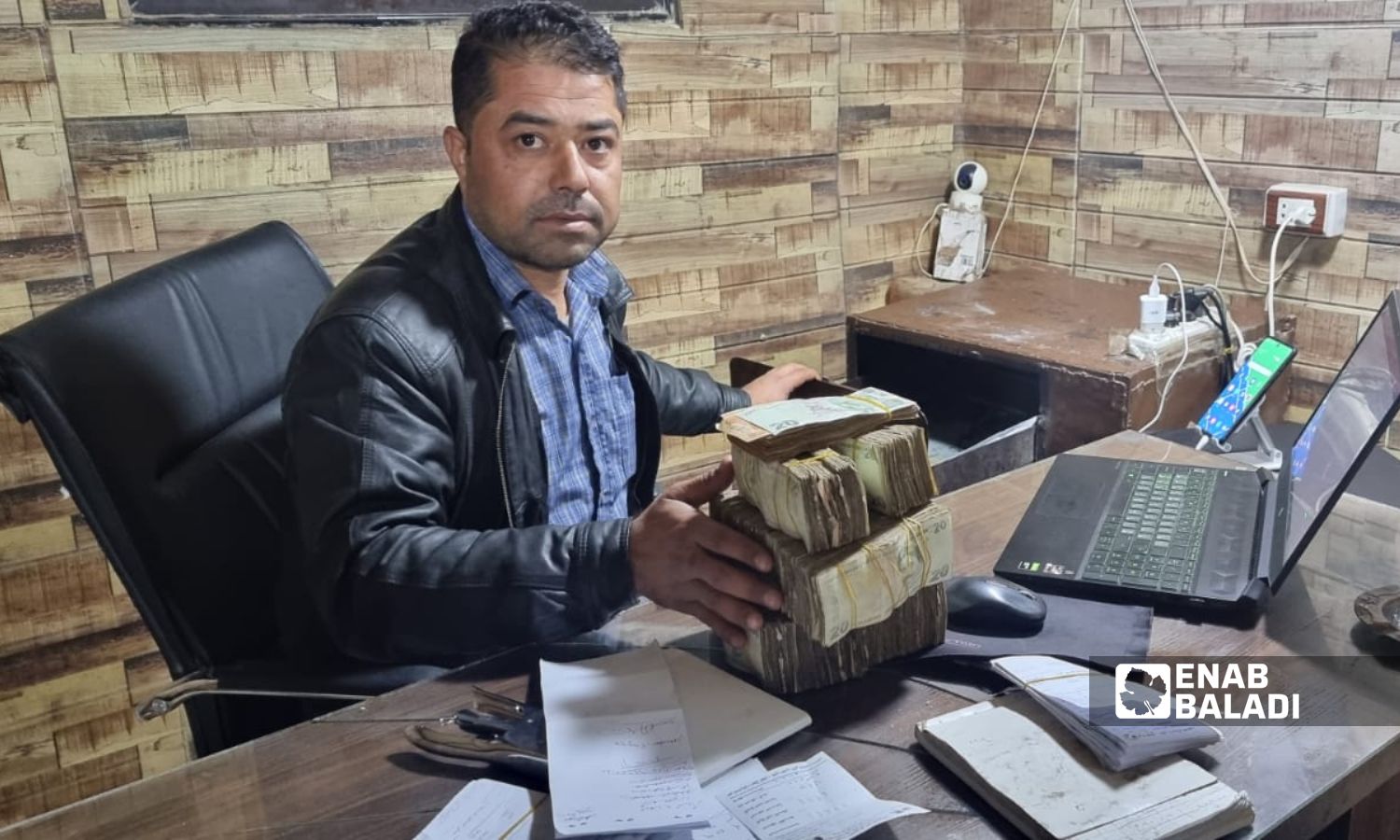



Enab Baladi – Anas al-Khouli
Merchant Bashir al-Haj Rahmoun complains of having 70,000 Turkish lira in small denominations in his till, as he is unable to use them to purchase new goods or exchange them for US dollars due to currency exchange offices’ refusal to accept these denominations or convert them at a lower value, forcing him to keep them until circumstances change.
Merchants in the al-Hal market in Idlib purchase their goods exclusively in dollars after the Syrian Salvation Government (SSG) issued a decree requiring trade in the American currency. Meanwhile, they sell goods in Turkish lira to retailers, leading to the accumulation of Turkish currency in small denominations, which they cannot get rid of due to the exchange offices’ refusal to accept them.
Rahmoun, a merchant in the al-Hal market and a member of the committee responsible for managing the market’s affairs, told Enab Baladi that when Turkish currency was in circulation, merchants had no problems, as buying and selling were in the same currency.
Furthermore, he added that with the issuance of the decree mandating the use of the US dollar in the al-Hal market, it was applied only in the market’s first circle, i.e., between the merchants and the suppliers, and not in the second circle between the merchants and the retail sellers, due to the unavailability of small US dollar denominations.
This situation forced merchants to sell their goods in Turkish lira and exchange them for US dollars to buy new goods. However, exchange shops refrain from accepting the conversion of small denominations of Turkish lira to dollars, leading to their accumulation with the merchants, according to Rahmoun.
Bassam Aljar, a merchant and accountant in the al-Hal market, told Enab Baladi that the percentage of small denominations in merchants’ cash registers amounts to more than 25% of the total money, indicating that the only party that accepts these denominations is the Sham Bank, and only up to 15% of the total amount intended for exchange, after a long wait until it is the merchant’s turn to exchange.
Merchants in the al-Hal market, who spoke to Enab Baladi, demanded that the responsible authorities issue decrees forcing exchange shops to accept the conversion of small denominations of Turkish currency into US dollars.
In his part, Rahmoun said that merchants formed an elected committee in the al-Hal market to resolve issues and that the committee has been in contact with the Ministry of Economy in the Salvation Government, and are still waiting for solutions to the problem, or merchants will be forced not to implement the decree of trading in US currency and revert to dealing with the Turkish currency.

Turkish 20-lira notes piled up with a merchant in Idlib – January 19, 2024 (Enab Baladi/Anas al-khouli)
As a solution to the problem, merchants resorted to exchanging amounts of small denominations at a lower rate than their actual exchange value or transferring them among themselves at a lower value during business transactions.
Merchant Bassam Aljar said that merchants are dealing with these small denominations of 10, 20, and 50 lira, at a rate lower than their actual exchange value as a temporary solution. For example, if 100 dollars are equal to 2800 Turkish lira, the merchant pays 2900 Turkish lira in small denominations to buy 100 dollars.
Ahmed al-Sayed Youssef, owner of a currency exchange office in Idlib, confirmed to Enab Baladi the exchange shops’ refusal to accept small denominations, fearing their accumulation in their tills and citizens’ refusal to take them from them.
He added that the small denominations of Turkish currency are subject to supply and demand laws; as their supply increases in the market, they are exchanged at a lower price. He noted that the demand for small denominations increases during specific periods such as holidays and Ramadan, which is why they are exchanged at a higher rate than their actual value.
Additionally, Mohammed Khalid Zakour, a currency exchanger in Idlib, stated that the exchange reference for currency exchangers in Idlib is the Sham Bank, and the bank’s refusal to accept small denominations from merchants incentivizes the currency exchangers to refuse their circulation.
In June 2020, both the Salvation and the Syrian Interim governments, operating in northern Syria, adopted the Turkish lira as a currency for circulation, as it is more stable than the Syrian pound, along with the US dollar being used in external commercial transactions.
The replacement of the Syrian pound with the Turkish lira in northern Syria came after the exchange rate reached the limit of 3500 Syrian pounds to the dollar in June 2020, amid demands from Syrians that the swap be a temporary solution until a political resolution is reached.
In 2018, Hayat Tahrir al-Sham (HTS) established the Sham Bank in Idlib city, after converting the Al-Wasit financial transfer company, which it was managing, into a bank, formerly known as the Industrial Bank.
Turkish post office “PTT” branches, which serve as a Turkish bank in northern Syria, are distributed in 11 cities in the Aleppo countryside under the control of the Syrian Interim Government, and there is no branch in areas under the control of the Salvation Government.
The post centers provide the ability to open personal bank accounts, where citizens can deposit their money or withdraw the deposited amounts at any time, as well as delivering employee pensions, as teachers, police, council employees, doctors, and mosque preachers in those areas were given banking cards to withdraw their salaries, in addition to cash transfer and external shipping services.
The Turkish currency in circulation in Idlib is prone to damage, and the damage rate may reach a level where merchants and fuel stations refuse to accept and deal with it, and this extends to the US dollar as well.
Currency exchanger Ahmed al-Sayed Youssef explained that currency exchangers and the bank’s refusal to trade small denominations of Turkish currency is due to the high damage rate among these denominations and lack of care in their preservation.
The financial director at the Public Monetary Institution of the Salvation Government, Mustafa Akkoush, stated that there is significant negligence in handling the Turkish paper currency by citizens, indicating that the currency in northern Syria had been completely replaced three times since its introduction.
Additionally, the financial director of the institution told Enab Baladi that the al-Hal market is considered the last resort for these damaged currencies, as those who possess worn-out currencies that no one accepts, transfer them to the al-Hal market through vegetable sellers, who accept the banknotes without noticing the extent of damage that has befallen them, leading to the accumulation of large sums in the market, and no one accepts them from the merchants.
He pointed out that small denominations deteriorate much faster than larger ones, due to frequent handling and lack of care; accumulating in merchants’ hands in the market without anyone accepting them, according to Akkoush.
He emphasized the need to pay attention to the Turkish currencies circulating in northern Syria and to preserve them, and for citizens and merchants to refuse to accept damaged notes, noting that the institution will replace the damaged notes at the beginning of next year.
if you think the article contain wrong information or you have additional details Send Correction